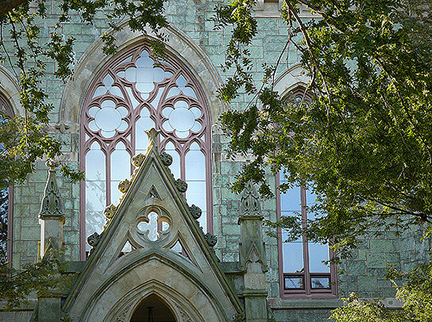
Jennifer Rusk’s first college interview took place in a crowded auditorium in Boston, and it began with an unusual request: Would she and her fellow group members please do their best imitation of a can opener? After some inter-group coordination, she recalls, “We lifted up this really skinny girl and cranked her around.” But Rusk had no idea this was the first step of an admissions process that would eventually land her in Bryn Mawr College’s class of 2004.
Such was her introduction to the Posse Foundation, a nonprofit founded by Deborah Bial 20 years ago that aims to identify public high school students with great potential that doesn’t show up on traditional measures like PSAT scores or class rank. Posse serves as a conduit connecting seven of the country’s largest urban school districts with 35 of its most selective liberal arts colleges, dispatching teams of promising students (“posses”) from the former to the latter to lend each other mutual support. Next year one will come from Miami-Dade County to Penn, which became the first Ivy League institution to partner with the Foundation in July.
Rusk’s can-opener assignment sounds like an exercise in experimental theater, but it’s typical of the Posse model, which focuses on traits like leadership and group communication. Looking back, she says, she realizes they were really watching to see which students stepped forward to take charge, and who could organize effectively.
So instead of filling in multiple-choice bubbles with a No. 2 pencil, students nominated by their school principals or guidance counselors are asked to work in teams on tasks like public speaking, debate, and negotiation. About half are invited back to submit a writing sample and sit for a one-on-one interview. Since several posses come from each source city, at this point the nominees are asked to decide between the three or four partner schools assigned to their location. After another cut, 20 finalists return for a workshop where they’re challenged—again as a group—to debate difficult subjects, which can range from racial discrimination to religious issues. This yields between eight and 12 students who will form the posse. They meet weekly for the remainder of their senior year, preparing to make the leap to higher education together.
The process is exhaustive, and highly selective. In 2009, from an initial group of more than 9,000 nominees, 430 students were selected as scholars, an acceptance rate of less than 5 percent.
The procedure grew out of Bial’s doctoral research at the Harvard Graduate School of Education. She focused on identifying non-cognitive traits that predict high achievement in college and beyond. In 1999 she received a $1.9 million Mellon Grant for her dissertation work. She launched the Posse Foundation the same year. What started as a concept has developed into a comprehensive support system.
Once the Posse scholars reach Penn’s campus, they’ll benefit from mentorship programs with interested faculty—often tenured professors—who commit two years to working with the students.
The approach appealed to Eric Furda C’87, who since becoming dean of admissions last year has pushed to find new ways to reach potential undergraduates who would never otherwise have considered Penn [“Gazetteer,” July|August]. The admissions office already sends mail to economically disadvantaged students, and it has also taken measures like translating its financial aid materials into Spanish. But finding the students to benefit from these measures has been another matter.
As part of this push, Penn has partnered with the QuestBridge program, which locates academically high-achieving students whose families face economic challenges (most earn less than $60,000 a year). But even a program like QuestBridge relies on traditional measures of high school success—three-quarters are from the top 5 percent of their class, with an average SAT score of 1940.
Posse’s radically different recruitment model offers a rare opportunity to reach deep into a sprawling public school system, and find students whose potential might be masked by an underperforming high school. Reaching cities like Miami (and the Southeast in general) is a strategic goal for Penn Admissions, but finding the inroads can be a challenge.
Posse solves the problem by setting up a local office. That provides what Bial calls the “luxury” of proximity to every high school in the district, in a way that’s impossible for a visiting admissions representative. “The path to a place like Penn is very different for different groups of students,” Furda says, and geography still plays a powerful role in shaping the list of colleges that most students consider [See page 30]. What’s more, fast-growing states like Florida and Texas are outside of what Furda terms the “college corridor” from Virginia to Massachusetts. If Penn wants to attract students from these areas, he says, “just sending them a viewbook once a year isn’t going to do it.”
So this past spring, when Furda stopped by Posse’s Manhattan office on a routine recruitment trip, the mention of their new Miami-Dade location grabbed his attention. He had to act fast—the new office was set to open its doors in July, and recruitment would begin in August. The potential alliance gained steam when President Amy Gutmann expressed her support; two months later the partnership was finalized.
The Posse selection process breaks new ground, but it could also raise questions about the compromises required by such a collaborative admissions paradigm. “Some schools would look at this program and say, are we giving up control?” Furda says. Though they’ll arrive on campus as a group, each Posse nominee fills out the Common Application, and each application is read separately. On the day of the final workshop, Furda and a small team of admissions officers will fly down to Miami to meet the 20 finalists in person. The program isn’t guaranteed any particular number of slots, and Furda stresses that Penn has the final word. “There’s one office that admits students, and that’s at 1 College Hall,” he says. Posse’s role is not admissions; it’s identification.
Furda sees Posse’s mission as being aligned with the directive of increasing access articulated in the Penn Compact. “This really started from the Compact,” says Furda, and “without all those pieces lining up, it’s not going to get done.”
“There are some core values at Posse that I think are shared by Eric and Amy,” says Posse founder Deborah Bial, including the importance of leadership in the definition of merit. She believes an over-reliance on standardized testing has narrowed this definition. Penn is the first Ivy League school to host a posse, but working within the Ivy League system of need-based financial aid could present logistical challenges. Every school that’s partnered with Posse up to now has given merit-based scholarships to those students that fully cover tuition. Penn’s strictly need-based financial aid offers no such guarantee, but, says Bial, “We decided to try this experiment with Penn in part because Penn’s financial aid program is so extraordinarily generous.” Particularly since Penn has shifted towards loan-free packages, the hypothesis is that Posse scholars will be awarded aid packages at Penn that don’t saddle them with debt, and that closely resemble the merit-based awards they’ve enjoyed at previous schools. For the first time, this is possible “for students not just of low-income but of middle-income,” says Bial.
A project like Posse is an easy target for misperceptions, and in the past the program has been forced to shake off assumptions that’s it’s simply an access program, or some variant of Affirmative Action. “It’s not a minority program,” says Bial, and “it’s not a need-based program. A student from any socioeconomic background can be nominated and win a Posse scholarship.”
Jennifer Rusk is Exhibit A. “I’m a white, blond girl,” she says bluntly, “and I looked like every girl at Bryn Mawr.” She suggests that Posse has the power to change the way people think about diversity itself, replacing simple questions of skin color with a more nuanced definition that might allow a white girl from an Irish-Catholic family in Boston to earn a scholarship as part of a diversity initiative.
In the next 10 years, the Posse Foundation projects that it will have close to 6,000 alumni in the workforce. “They will have come from our top institutions of higher learning,” says Bial, “and they will be a diverse group, and they will be sitting at the tables where decisions get made. That’s not been seen before in this country.”
—Sean Whiteman LPS’11




